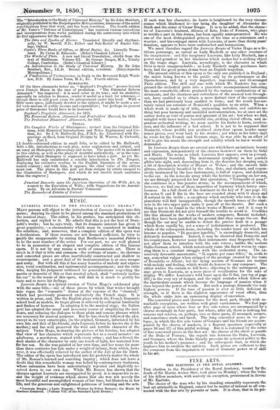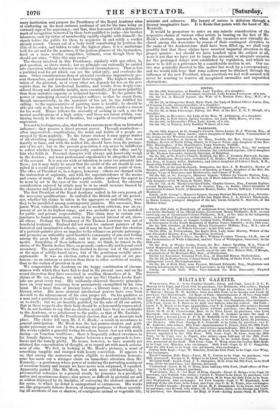FINE ARTS.
THE ELECTIONS AT THE ROYAL ACADEMY.
THE election to the Presidency of the Royal Academy, vacant by the death of Sir Martin Archer Shea, took place on Monday ; when the voice of his fellow members, with scarcely an exception, pronounced in favour
of Mr. Eastlake.
The choice of the man who by his standing ostensibly represents the best art attainable in England, cannot but be matter of interest to all connected with the fine arts by pursuits or taste. It is dear, that in its psi mary institution and purpose the Presidency of the Royal Academy aims at conferring on the most eminent professor of art for the time being an outward sign of his supremacy; and that, thus honoured with a distinctive mark of recognition bestowed by those best qualified to judge—his brother labourers, each by virtue of membership equally eligible with himself—he stands before the public for them to acquiesce in and ratify a verdict already passed. Chosen out of a body itself constituting by position the elite of its order, and bidden to take the highest place, it is a misfortune both for art and for the nominee, if the jealous glances of the bystanders, fixed on a more worthy competitor, intimate, even though their lips should not utter, "Give this man room." The theory involved in this Presidency, similarly with any other, is, past question, as above stated ; but no principle can rationally be earned into execution without reference to collateral circumstances. That is but a purblind zeal for art which can see the artist only, and overlooks the man. Other considerations than of pictorial excellence imperatively present themselves, and demand to have their weight. The highest manifestation of the pictorial, as of every other art, depends far less on the perceptive than on the intellectual faculties, and results from deeply-considered theory and scientific insight, more essentially, if not more palpably, than from imitative capacity or technical knowledge. To the painter the power of embodying elevated principles suffices ; so that he assert them, though unconsciously, in the materials of his art, he has fulfilled Ins calling : to the representative of painting more is needful ; he should be able not only to do, but to know why he has done, and to render a reason for his work. Hence follows the necessity of seeking in such a one for mental qualifications of a high order,—and these not latent within, continuing merely in the state of faculties, but capable of receiving adequate expression. It is not to be forgotten, also, that the arts exercise more than an historical influence ; they possess a direct present power. Through numberless— often unperceived—ramifications, the mind and habits of a people are swayed by them mightily. To the future student it may appear matter of all-absorbing importance, that the painter whose works live most durably in fame, and with the noblest life, should have been the protagonist of his art ; but to the present generation it can never be indifferent to reflect whether honour is reciprocally conferred by the office and by him who holds it. Personal character will always and deservedly weigh in the decision ; nor must professional expediencies be altogether left out of the account. It is not our wish or intention to enter too minutely into these ; yet it may fairly be urged that the credit of the art should be consulted in a social and corporate as well as in an abstract point of view. The office of President is, in a degree, honorary : others are charged with the instruction of aspirants, and with the superintendence of the means and course of study; the President's public duties embrace the aspect to be worn by art in the eyes of the world outside. Indeed, the external consideration enjoyed by artists may be in no small measure biassed by the character and position of its chief representative.
The first President of the Royal Academy united in his own person all the necessary qualifications : he embodied the British art of the period ; nor, whether his claims be taken in the aggregate or individually, were they to be paralleled among contemporary painters. His successor, Benjamin West, vulnerable as his works are in modern criticism, was an exponent of art in its highest range, and was probably not to be matched for public and private respectability. This claim may in certain conjunctures be found paramount, even in the general interest of art, above all others. Perhaps the Presidency of Sir Thomas Lawrence was not of beneficial tendency. England did not want for eminent painters of the historical and imaginative schools ; and it may be feared that the election of a portrait-painter gives an impulse to the reliance on private patronage, and promotes an unhealthy spirit hurtful to community of aim and feeling among the great body of artists, and to the pursuit of art on its own merits. Something of these influences may, we think, be traced in the choice of Sir Martin Archer Shee, on grounds confessedly and beyond cavil secondary. The question was then decided in favour not of the painter or the man of solidly-based views, but of the gentleman socially unexceptionable. It was an election rather to the presidency of art professors—to an embassy or mission from them to other sections of society, than to the station of president in art.
We congratulate the Academy on the happy combination of circumstances with which they have had to deal in the present ease, and on the sound discretion they have exercised in availing themselves of it. The claims of Mr. (or, perhaps, we might now say Sir) Charles Locke Eastlake are great every way. His uniformly-observed theoretic principles have on very many occasions been persuasively exemplified by his own hand. He is more than of literary tastes—a literary man ; yet more, a literary artist. His more abstruse intellectual powers have ever been devoted to the advancement of his own proper art. On his qualities as a man and a gentleman it would be equally superfluous and indelicate for us to dwell ; but we are heartily gratified, for the sake of all our artists, that in these respects also their body should be so honourably represented. We do not hesitate to say that no election would have been so creditable to the Academy, or so satisfactory to the public, as that of Mr. Eastlake.
Simultaneously with the Presidential election that of an Associate took place. The choice fell upon Mr. J. C. Hook,—a result in accordance to general anticipation. Mr. Hook was the last painter-student and goldmedal prizeman sent out by the Academy for purposes of foreign study. His works exhibit a graceful feeling for colour, based--but not with much daring—on Venetian traditions ; there is frequently refined sweetness in his female figures, varying in degree between a near approach to loveliness and the tamely pretty. He seems, however, to have scarcely yet attained due concentration of thought, or to regard art with much seriousness of aim. We feel, in looking at Mr. Hook's pictures, a want of something tangible and stamped with hearty conviction. It appears to us, that among the numerous artists eligible to Academician honours, none has made out a stronger claim on immediate attention than Mr. Kennedy,—a gentleman whose power of realizing the pervading sentiment of sensuous beauty and luxury we have never seen surpassed, if equalled. Apparently guided (like Mr. Hook, but with more self-knowledge) by preconceived reference to a general result, he possesses in a peculiarly native and spontaneous degree, that power, so difficult in pictorial art and so seldom displayed by its disciples, of conveying the abstract emotion of his scene, to which no detail is unimportant or extraneous. His works are like gorgeously delicate flowers, of strange perfume, to whose nourishing all accidents of sun or shadow, of contiguous animal or vegetable life, minister and subserve. His luxury of nature is delicious through a dreamy imaginative haze. It is Keats that paints with the hand of Mr. Kennedy.
It would be premature to enter on any minute consideration of the respective claims of various other artists as bearing on the fact of Mr. Hooks election, inasmuch as, when all the vacancies now virtually declared among the Associates by reason of their contingent elevation to the ranks of the Academicians shall have been filled up, we shall very possibly find that those claims have received impartial attention in the proper quarter : nor should we have touched upon the subject at all, were it not that we have yet to learn the necessity or adequate occasion for the prolonged delays now established by regulation, and which we know to be felt as a grievance by a considerable section in art. Our notice was pointedly directed to this matter last week by a correspondent; and we would fain hope that some redress may be obtained through the influence of the new President, whose exertions we feel well assured will never be wanting to remove all recognized anomalies and unjustified obstructions.

























 Previous page
Previous page